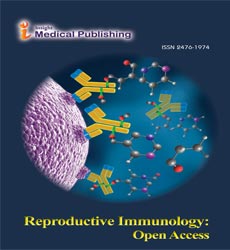Abstract
Regulation of T-cells in Pregnancy
Pregnancy expects adjustments to maternal T-cell resistant
reactions, with the end goal that the fetal allograft is perceived, yet
not dismissed. Upon antigen introduction T-cells can separate into
resistant effector cell types, Th1, Th2, Th17 or administrative T-cells
(Treg). Th1 and Th17 are essentially associated with provocative and
cell resistance and secure against intracellular microorganisms and
malignant growth. Th2 cells are engaged with humoral invulnerability
and disposal of extracellular pathogens and Tregs advance the
enlistment of resistance. In pregnancy, effective implantation is
subject to an underlying incendiary reaction, which is then abridged
to empower pregnancy movement.
Author(s):
Gopa Mishra
Symbiosis International, India
Abstract | PDF
Share this

Google scholar citation report
Citations : 237
Reproductive Immunology: Open Access received 237 citations as per google scholar report
Abstracted/Indexed in
- Google Scholar
- Sherpa Romeo
- China National Knowledge Infrastructure (CNKI)
- Secret Search Engine Labs
Open Access Journals
- Aquaculture & Veterinary Science
- Chemistry & Chemical Sciences
- Clinical Sciences
- Engineering
- General Science
- Genetics & Molecular Biology
- Health Care & Nursing
- Immunology & Microbiology
- Materials Science
- Mathematics & Physics
- Medical Sciences
- Neurology & Psychiatry
- Oncology & Cancer Science
- Pharmaceutical Sciences

